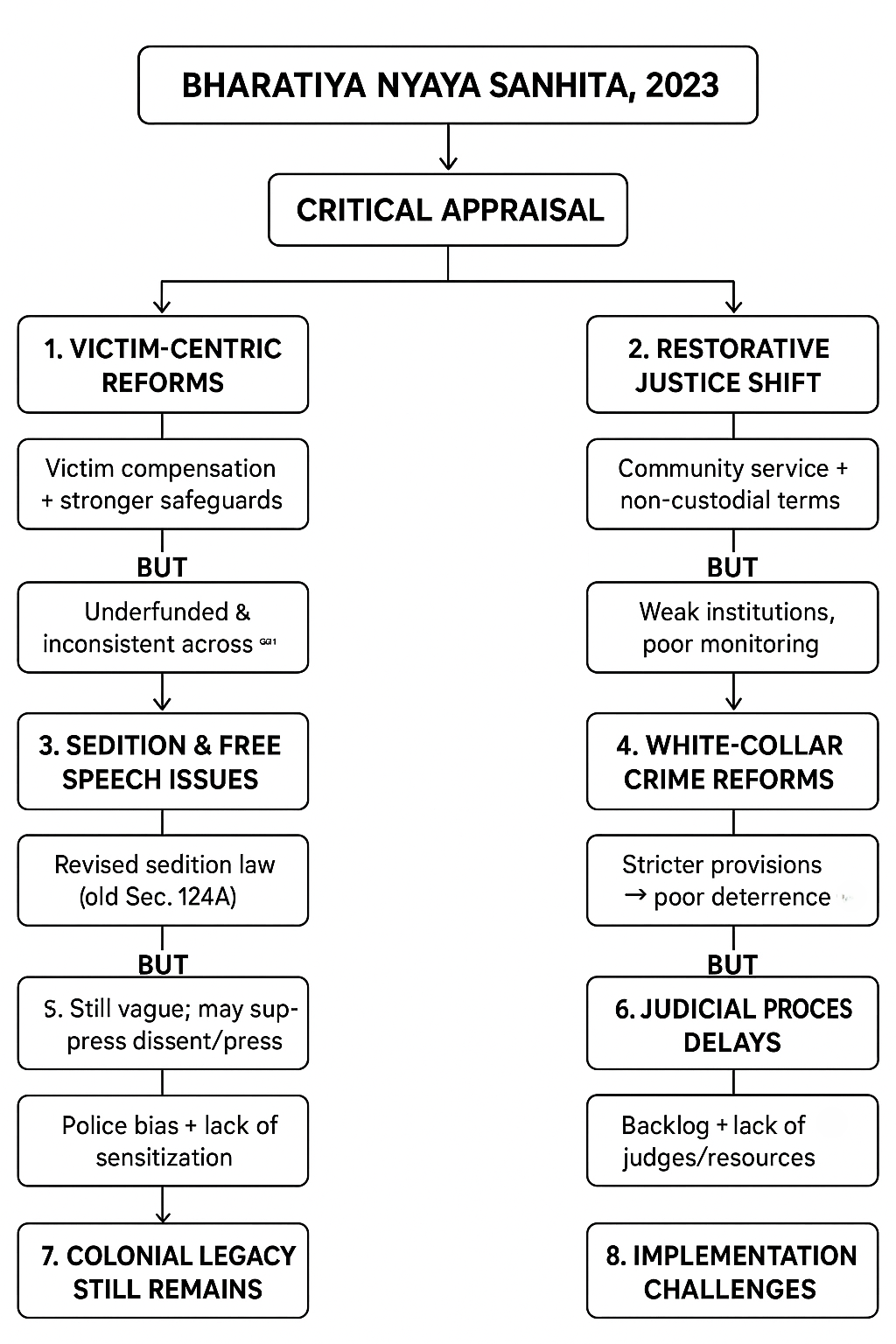The Bharatiya Nyaya Sanhita (BNS), 2023, replacing the Indian Penal Code (IPC), 1860, represents a crucial shift in India’s legal system, attempting to align with modern principles of justice, such as fairness, equality, victim-centric justice, and efficiency. While the IPC served its purpose in colonial India, its approach to justice was largely punitive and disconnected from democratic values and evolving societal needs. A critical examination of the BNS in comparison to the IPC highlights both its advancements and areas where it may need further refinement.
- Victim-Centric Reforms The BNS introduces victim compensation and improved safeguards for victims, particularly in cases involving sexual harassment and gender-based violence. This shift addresses long-standing criticisms of the IPC’s indifference toward victims. However, while these reforms are progressive, victim compensation schemes are often underfunded and inconsistently applied across states, which could hamper their effectiveness.
- Restorative Justice Focus BNS 2023 moves towards restorative justice, offering alternatives such as community service and non-custodial sentences for minor offenses. This is a significant step forward, reducing the burden on India’s overcrowded prisons. However, successful implementation requires robust institutional frameworks that currently do not exist, particularly in rural areas. The lack of proper monitoring mechanisms could lead to these alternatives being underutilized.
- Sedition Law and Freedom of Expression A critical aspect of the BNS is its revision of the controversial sedition law under Section 124A IPC, which has historically been used to suppress dissent. While the BNS attempts to redefine sedition, many argue that the new provisions are still vague and could continue to be used to curb freedom of speech and press freedom. The redefinition does not fully align with the Supreme Court’s call for a complete overhaul of sedition law.
- Crackdown on White-Collar Crimes The BNS introduces stricter provisions for handling white-collar crimes, an area where the IPC was deemed outdated. However, without sufficient enforcement mechanisms, these provisions may not deter high-profile economic offenders who often evade prosecution.
- Protection of Marginalized Groups The BNS offers greater protection for women, Dalits, and other marginalized communities. It strengthens measures against honor killings, but unless the police and judicial systems are sensitized and made accountable, these legal provisions may not achieve their desired effect. Biases and discriminatory practices within law enforcement remain a barrier.
- Delays in Judicial Processes While the BNS seeks to streamline judicial processes, India’s judiciary suffers from structural issues, including case backlogs and inadequate resources. Reforms like fast-tracking cases for serious offenses are commendable, but without increasing judicial capacity, delays are likely to persist.
- Retaining Colonial Legacy in Certain Areas While BNS 2023 aims to shed its colonial baggage, some provisions retain a colonial character, particularly in the context of policing and public order. Certain punitive measures and laws regarding public assemblies remain largely unchanged from the IPC, potentially enabling continued suppression of dissent and protests.
- Skepticism Regarding Implementation Despite the progressive aspirations of the BNS, there is skepticism regarding its implementation. India’s legal and law enforcement infrastructure is not adequately equipped to handle such a major transformation. Issues like police corruption, judicial delays, and poor victim support systems may undermine the impact of these reforms.
Examples and Case Studies:
- Nirbhaya Case: The shift towards victim-centric justice in BNS echoes public demands seen in high-profile cases like the Nirbhaya gang-rape case, where delayed justice and lack of victim support were widely criticized.
- Sedition Law Misuse: Recent cases of the anti-CAA protests and the farmers’ protests illustrate how sedition laws have been used to stifle dissent. The BNS’s failure to completely abolish the controversial provisions underlines lingering concerns about free expression.


I want to show my love for your kind-heartedness supporting people that absolutely need guidance on this important matter. Your very own dedication to getting the message all over ended up being definitely practical and has truly empowered ladies much like me to arrive at their endeavors. The useful help means so much a person like me and especially to my colleagues. Thanks a lot; from everyone of us.
The BNS has a well-structured format that makes it easy to understand. It is highly recommended for people to join.”